Dot Physical Blood Pressure Medication
Blood pressure measures the force of blood pushing against the walls of the arteries. Normally, it rises and falls throughout the day. High blood pressure — also called hypertension — occurs when blood pressure remains high.
About 108 million American adults — or 45 percent — have hypertension. The condition is only under control in about half of these people, according to the Centers for Disease Control and Prevention.
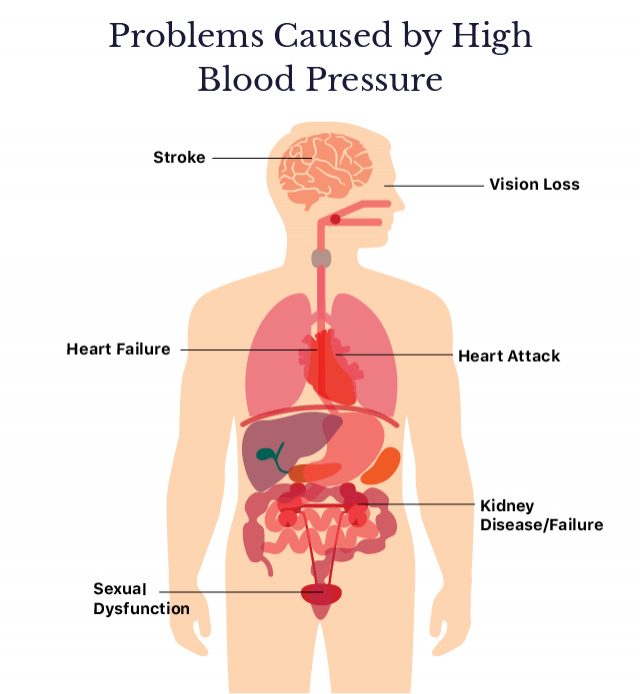
EXPAND
Health problems caused by high blood pressure usually develop over time.
High blood pressure is largely symptomless, which is why it's often called a "silent killer." It puts people at risk for several diseases, from heart problems and stroke to eye damage and blindness.
"Many patients don't know they have high blood pressure and therefore have these risks. I find the common misconception amongst my patients is that if their blood pressure is less than 140/90, 'they're good,' but that's not true," said Dr. Kayla Dick, a board-certified family practitioner in Mansfield, Texas.
People can control high blood pressure by using medications, natural methods such as lifestyle and diet changes or a combination of the two.
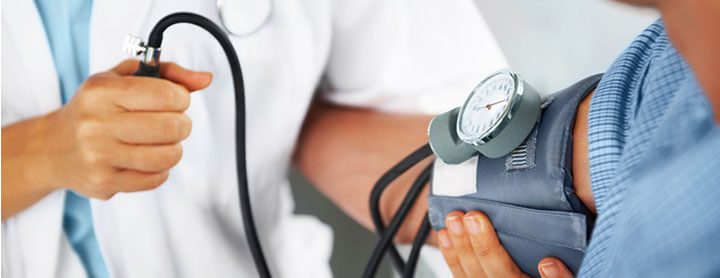
What Causes Hypertension?
Researchers don't know the exact cause for high blood pressure, but several risk factors can lead to it. In blood pressure measurements, the first number — systolic blood pressure — measures the pressure against artery walls when the heart beats and pumps blood. The second number, diastolic, measures the pressure in between beats.
Did you know?
Obesity contributes to about 30 percent of hypertension cases. In men under age 45, the number may be as 60 percent.
Health practitioners consider anything above 130/80 as hypertension, though there are different degrees of hypertension.
Health practitioners consider anything above 130/80 as hypertension, though there are different degrees of hypertension. A blood pressure above 120/80 is considered elevated, above 130/80 is considered stage 1 hypertension. Stage 2 hypertension is when the systolic is above 140 or the diastolic is above 90.
"Normal blood pressure is 120/80 or lower," said Dick. "A patient whose blood pressure averages 130/80 may be at double the risk of cardiovascular events over their lifetime compared to someone whose blood pressure is averaging 115/70."
Hypertension Causes and Risk Factors
- Family History
- Race
- Being overweight or obese
- Physical inactivity
- Smoking
- High-sodium diet
- Frequent heavy alcohol consumption
- High cholesterol
- Diabetes
- Older age
- Hormone problems
- Stress
- Caffeine consumption
- Medications such as birth control pills, antidepressants, Tylenol (acetaminophen), cold and cough medicines and nonsteroidal anti-inflammatory drugs (NSAIDs)
Source: American Heart Association
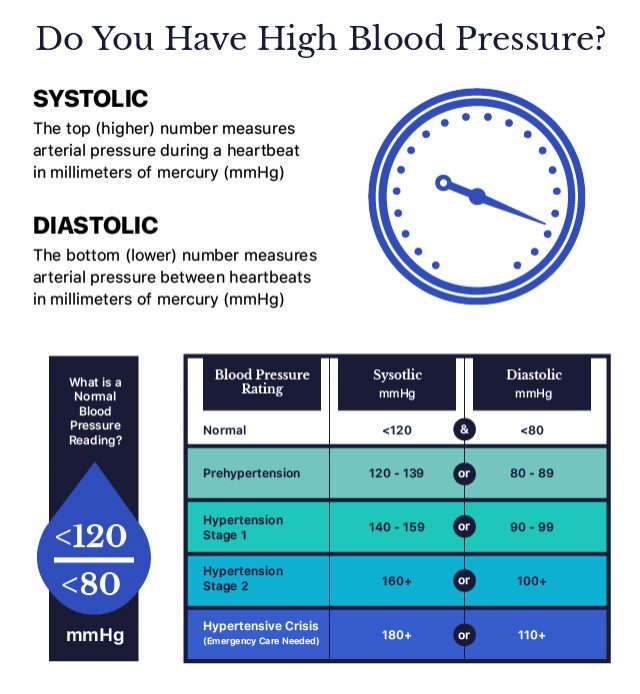
EXPAND
A blood pressure reading above 120/80 is considered prehypertension.
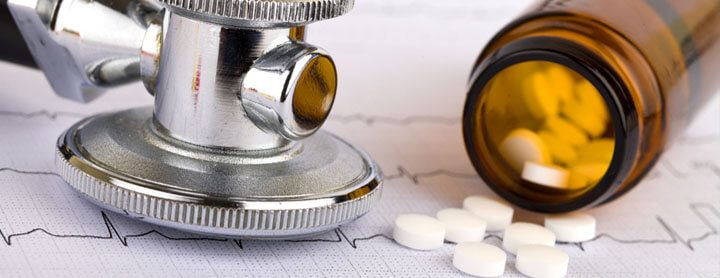
Treatment with Medication
For many health practitioners, blood pressure medications are the first line of treatment for patients with uncontrolled hypertension.
There are several classes of blood pressure medication. Some are more effective based on a patient's ethnicity, and some people may need more than one medication, Dick explained.
"It is not uncommon to need more than one medication to achieve control," she said. "Most blood pressure medication options are generic and therefore mostly affordable for most patients."
Common Drugs and Side Effects
| Drug Class | Drug Names | Common Side Effects |
|---|---|---|
| Angiotensin-converting enzyme (ACE) inhibitors | Lotensin (benazepril), Vasotec (enalapril), Prinivil and Zestril, (lisinopril), generics and others | Dry cough, allergic reactions, reduced kidney function, high potassium levels, angioedema (facial swelling) |
| Angiotensin receptor blockers (ARBs) | Cozaar (losartan), Atacand (candesartan), Diovan (valsartan), generics and others | Similar to ACE inhibitors, although ARBs are less likely to cause coughing |
| Thiazide diuretics | Chlorthalidone, hydrochlorothiazide and others | Low potassium levels, frequent urination and erectile dysfunction |
| Calcium-channel blockers | Cardizem (diltiazem), Norvasc (amlodipine), generics and others | Dizziness, fast or slow heartbeat, flushing, headaches, swollen ankles and constipation |
| Beta blockers (not recommended as first-line treatment for high blood pressure) | Sectral (acebutolol), Tenormin (atenolol), Zebeta (bisoprolol), Lopressor and Toprol XL (metoprolol) and others | Cold hands or feet, fatigue, slow heartbeat, symptoms of asthma, erectile dysfunction |
"I remind my patients that the medication not only lowers their blood pressure but [also] protects their organs from high blood pressure," Dick said. "Several classes of blood pressure medication also work on the so-called diseases of aging, such as stiffening of the heart muscle, stiffening of your arteries [and] weakening function of your heart."
By treating high blood pressure, patients are able to decrease consequences such as stroke, heart attack, heart failure, and kidney disease.
Before choosing a blood pressure medication, there are a few things to consider. These factors can determine what medication you and your health provider choose to treat hypertension. These drugs all work best when combined with lifestyle changes and a healthy diet.
Things to Consider When Choosing Medication
- Are you otherwise healthy?
- Recommended treatment agents are angiotensin-converting enzyme (ACE) inhibitors, angiotensin receptor blockers (ARBS), calcium channel blockers, or thiazide diuretics. Younger people generally do well with classes of medication called angiotensin-converting enzyme (ACE) inhibitors or angiotensin receptor blockers (ARBs). Practitioners may start older patients on thiazide diuretics and calcium channel blockers due to potential side effects with each medication. ACE inhibitors and ARBs may also be used.
- Are you African American?
- All people should consider how certain drugs affect their ethnic group. African Americans have lower levels of hormones that control blood pressure, so ACE inhibitors and ARBs aren't as effective. Instead, calcium channel blockers and thiazide diuretics are a better pick.
- Do you have diabetes, heart failure, heart disease or kidney disease?
- ACE inhibitors or ARBs work best for people with these conditions. But other classes of medications may be utilized that add protective benefits for the heart. For example, beta blockers are recommended following a heart attack and in patients with heart failure.
- Is your blood pressure 140/90 or above?
- People with severe hypertension may require more than one medication. ACE inhibitors and ARBs shouldn't be used together. Your provider will decide on a good combination for you.
- Are there any recalls on medications?
- In 2018 and 2019, several manufacturers issued valsartan recalls because of manufacturing impurities that could cause cancer. That recall has since expanded to other ARBs such as losartan. Providers may choose a medication based on availability.
Valsartan Recall
The FDA recalled certain lots of valsartan because of contamination with NDMA, a possible carcinogen. Find out what to do if your drug was part of the recall.
View Recall
Can You Get Off Medication?
According to Dick, some patients may be able to reduce or even stop their medications by quitting smoking, losing weight or getting more exercise.
"Lose weight or even just start exercise. Often someone overweight can lower or control blood pressure with an exercise routine even if they do not lose weight," Dick said.
Patients can reduce intake of salt, sugar and processed foods and eat more vegetables and fruits, too.
"I always remind my patients that they may not be able to get off medications," Dick said. "Sometimes age, race, family history and genetics make it hard or not possible to get off medications, but their lifestyle choices may make the difference between being on one medication or [being on] three or four."
Hypertension Rates in the United States
In 2017, 43.5 percent of people in West Virginia had hypertension, the highest rate in the country. Utah had the lowest rate at 24.5 percent.
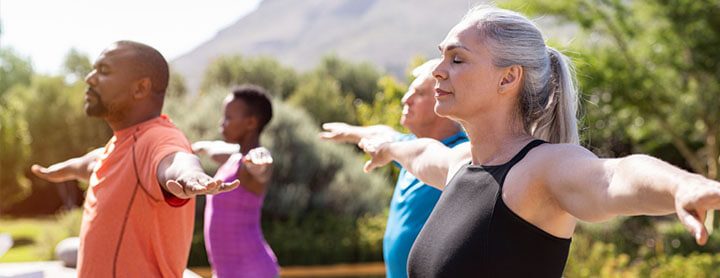
Natural Ways to Lower Blood Pressure
The advice Dick gives to her patients to lower blood pressure without medications is to lose weight, stop smoking and maintain a regular exercise routine.
"How much exercise you need to control your blood pressure without medication will vary based on your age, race, weight and all risk factors. The American Heart Association recommends 150 to 200 minutes a week of moderate-intensity exercise or 75 minutes a week of vigorous exercise," she said.
The recommendations break down to 30 minutes a day, five days a week. Adding in strength training two days a week is also a good idea.
Reducing stress also helps, Dick said. She tells her patients to find hobbies, volunteer in the community or meditate.
"I do have the occasional patient who changes jobs or retires and suddenly we have their blood pressure under control," she said.
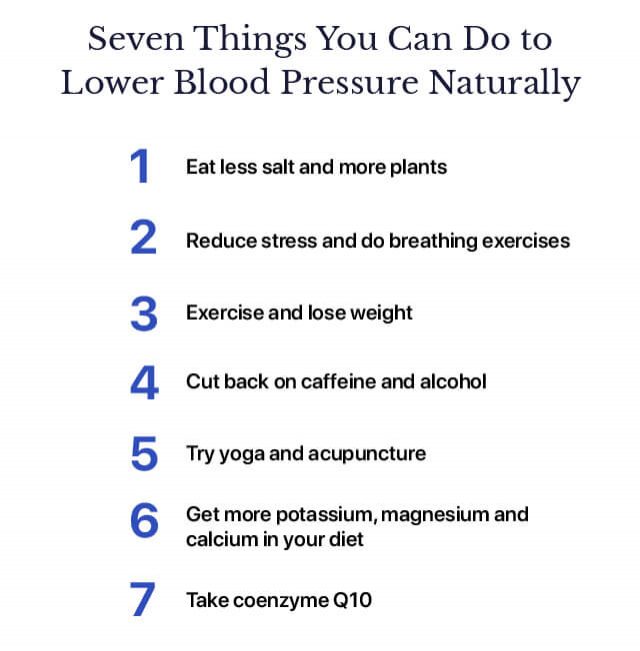
Yoga
In addition to regular exercise routines, yoga that combines gentle movement, deep breathing and meditation can be a good tool to keep hypertension at bay. People of all ages and skill levels can practice yoga.
One research review found that adults who practice yoga with breathing and relaxation exercises at least three times a week had lower blood pressure than people who didn't, Reuters reported.
"The more we move, even gentle movement, the healthier we are physically and mentally. Yoga isn't a cure-all, but it makes the body better able to fight off problems. We can get a positive attitude, strength and stamina, and then we can fight the disease better," said yoga instructor Ty Arnold.
He teaches all forms of yoga but says one type called Kundalini yoga is more therapeutic.
"It includes more meditation and breath work than many other types of yoga. Kundalini yoga works on the nervous system and massages the glands and organs to make them work more optimally," he said.
Acupuncture
Some studies show acupuncture can help reduce blood pressure without medication. One study by researchers at the Jiaozuo Tongren Hospital in China found acupuncture treated high blood pressure as effectively as a calcium channel blocker, according to an article in Integrative Practitioner.
Acupuncture physician Samadhi Artemisa combines acupuncture with meditative breathing exercises for her clients to help control blood pressure.
"There are points on the ear that can be used, and there are points along the body that can be used as well," Artemisa said. "The way that I approach meditation is through breathing which is easier to approach than just saying, 'We are going to sit quietly.' So doing guided breathing exercises is really helpful."
Supplements
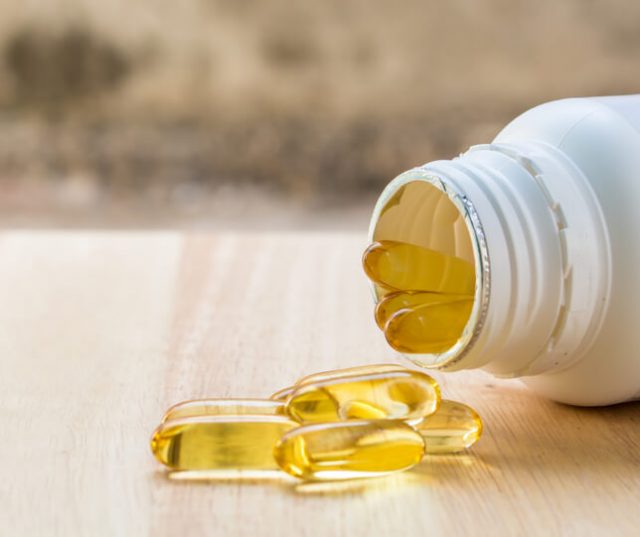
Coenzyme Q10, or CoQ10, is an antioxidant shown to reduce blood pressure.
Certain vitamins and supplements may help lower blood pressure. Always check with your health provider when trying any supplements or vitamins.
Minerals especially helpful in controlling blood pressure are potassium, magnesium and calcium, according to Harvard Health Publishing. These minerals can be obtained from food sources. If a patient has low levels, supplements may be helpful.
Patients on ARBs should be careful with potassium supplements because their potassium levels may get too high. Check with your doctor to see if a potassium supplement may be right for you.
Magnesium and calcium both help blood vessels to relax, but too much supplemental magnesium can cause diarrhea.
Some other promising supplements include vitamin C and coenzyme Q10.
In data reported by Pharmacy Times, studies found vitamin C supplementation lowered blood pressure for patients with low vitamin C levels. After four weeks of treatment with coenzyme Q10, systolic blood pressure decreased by 11 points and diastolic decreased by 7 points.
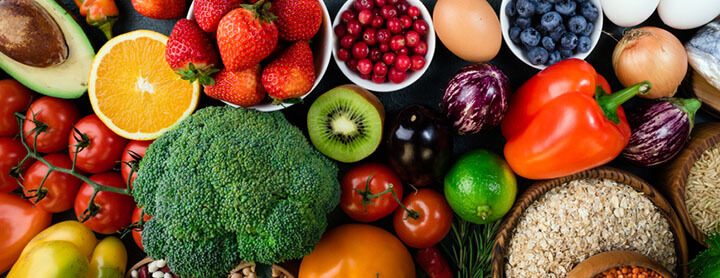
What to Eat
Certain foods can help lower blood pressure naturally. These foods contain antioxidants, vitamins and minerals that open up blood vessels and keep them healthy.
One such food is celery, a powerhouse when it comes to lowering blood pressure, according to Samadhi Artemisa.
"It can be cooked, juiced, chopped up and put into a salad or eaten as a snack with almond butter on it. Any way you eat it, whether it's cooked or raw, it's going to have the health benefit of lowering blood pressure through phytochemicals," Artemisa said.
Phytochemicals in celery called phthalides help to relax the artery walls and lower blood pressure, according to Cleveland Clinic. Studies found people with mild to moderate hypertension saw improvements after taking celery extract.
Some Other Foods that Help Lower Blood Pressure
- Bananas
- Berries
- Broccoli
- Celery
- Dark chocolate
- Garlic
- Leafy greens
- Legumes
- Melon
- Sunflower seeds
- Tomatoes
- Whole grains
If you would rather follow a diet, a few types may help prevent or reverse hypertension. Two of these are plant-based diets, the DASH diet and the Mediterranean diet.
Plant-Based Diets
Plant-based diets, sometimes called vegan diets, are high in whole, unprocessed plant foods like fruits, vegetables, whole grains, healthy fats and legumes.
Studies show plant-based diets can reduce blood pressure, according to Physicians Committee for Responsible Medicine. Researchers found vegetarians trend to have lower blood pressure than people who eat meat.
Plant-Based Diet Resources
- Dr. McDougall's Health & Medical Center
- Dr. Joel Fuhrman
- Dr. Esselstyn's Prevent & Reverse Heart Disease Program
- T. Colin Campbell Center for Nutrition Studies
- Forks Over Knives
The DASH Diet
U.S. News & World Report ranked the Dietary Approaches to Stop Hypertension (DASH) diet number two in the category of best diets overall for weight loss and health. The American Heart Association notes that the DASH diet has the most evidence showing it can decrease blood pressure. It may reduce blood pressure by an average of 11 mmHg in patients with high blood pressure.
Doctors and nutritionists created the diet as a way for people to control their blood pressure with diet and exercise. It focuses on adding lean protein, fruits, veggies, whole grains and low-fat dairy while decreasing sugar and tropical oils – like coconut or palm oil.
The Mediterranean Diet
The Mediterranean diet focuses on fruits, vegetables, bread and other cereals, potatoes, beans, nuts and seeds. The diet encourages you to eat low to moderate amounts of fish and poultry instead of red meat.
Some studies have shown the Mediterranean diet lowers blood pressure in both hypertensive and healthy people. The American Heart Association recommends the Mediterranean diet as a way to eat healthy. However, there are fewer studies supporting its use compared to the DASH diet.
Low Sodium Diet
The American Heart Association recommends a low salt diet, which can be combined with Mediterranean, DASH, and other diets for maximum benefit. Sodium intake should be limited to less than 1500 mg per day to help with high blood pressure. This can decrease blood pressure by about 5 mmHg.
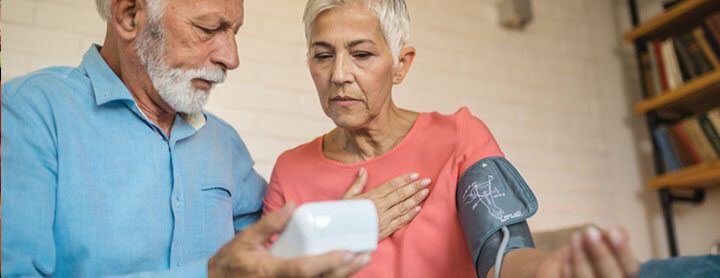
Monitoring Your Blood Pressure at Home
The American Heart Association recommends all people with hypertension monitor their blood pressure at home regularly. When choosing a blood pressure monitor, make sure that it takes measurements on your arm. Finger and wrist monitors are not as reliable.
Ask your doctor or pharmacist for advice on the best monitor to purchase. You may take the cuff to your doctor's office to make the results on your machine match the reading in the office.
Taking Your Blood Pressure
- Don't smoke, drink caffeine or exercise within 30 minutes of taking the reading.
- Make sure your bladder is empty.
- Sit still quietly for at least five minutes before taking the measurement.
- Sit with your back straight and supported and the upper part of your arm at heart level.
- Don't cross your legs. Feet should be flat on the floor.
- Measure at the same time every day, ideally in the morning and evening.
- Take multiple readings and record the results. Readings should be taken about a minute apart for a total of two to three times.
- Don't take measurements over clothes.
Source: https://www.drugwatch.com/health/cardiovascular-health/how-to-lower-blood-pressure/
Posted by: didomizioleenoes.blogspot.com
Posting Komentar untuk "Dot Physical Blood Pressure Medication"